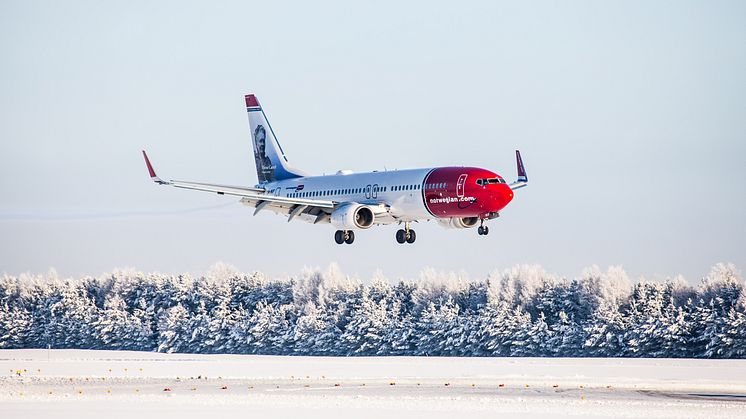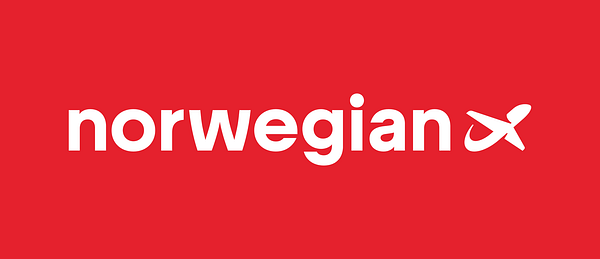
Press release -
Norwegian Group had 1.9 million passengers in November
In November, Norwegian had 1,531,361 passengers while Widerøe had 326,041 passengers, totalling 1,857,402 for the group. Capacity for Norwegian was up a solid 28 percent, while the load factor remained stable. Average flying distance increased by 17 percent compared to last year as the network includes more routes to warm winter and arctic tourism destinations.
“We are pleased that Norwegian delivered a small increase in load factor while at the same time achieving substantial double digit capacity growth compared to last year. This demonstrates that our winter programme is being received well by our passengers. Despite the unit revenue being impacted by a substantial increase in average flight distance, the unit cost is also substantially lower. November brought several days of challenging weather conditions that affected our operations. I would like to thank our colleagues for persevering and helping us achieve a satisfactory operational performance. Booking momentum appears encouraging, especially for the busy Christmas travel season, and also as a result of successful marketing campaigns,” said Geir Karlsen, CEO of Norwegian.
Norwegian’s capacity (ASK) was 2,556 million seat kilometres, while actual passenger traffic (RPK) was 2,109 million seat kilometres, both increasing by 28 percent from November 2023. The load factor increased by 0.1 percentage point from the same period last year, to 82.5 percent. In November, Norwegian operated with a regularity, meaning the share of scheduled flights taking place, of 99.1 percent. Punctuality was 81.0 percent, down 5.8 percentage points from November last year. Norwegian operated an average of 75 aircraft during November.
Norwegian top three in global SAF observatory
This week, the Sustainable Aviation Fuels (SAF) Observatory report was published by advocacy group Transport & Environment, ranking Norwegian among the top three airlines globally on sustainable aviation fuels commitment. The report highlights Norwegian’s commitment to e-Fuels as one of the key factors for the podium placement.
“We are very pleased with the ranking, which recognises Norwegian’s choices regarding sustainable aviation fuels. However, we see that the result from this report shows that aviation still has a long way to go, and we need greater support from the EU and local governments in the transition to cleaner fuels going forward. Today, alternative fuels remain too expensive. To mitigate risk for producers wanting to focus on sustainable aviation fuels, we need increased regulatory support. We also need corporate and public customers to follow the Norwegian Armed Forces example and commit to voluntary sustainable aviation fuel agreements,” said Geir Karlsen.
For Widerøe, the capacity (ASK) in November was 165 million seat kilometres, up 3 percent from last year. The actual passenger traffic (RPK) was 118 million seat kilometres, while the load factor was 71.3 percent, up 5.2 percentage points from November last year.
Separate press release on Widerøe’s traffic figures is found at the Widerøe media centre. (In Norwegian only)
Topics
Categories
About Norwegian
The Norwegian group is a leading Nordic aviation company, headquartered at Fornebu outside Oslo, Norway. The company has over 8,200 employees and owns two of the prominent airlines in the Nordics: Norwegian Air Shuttle and Widerøe’s Flyveselskap. Widerøe was acquired by Norwegian in 2024, aiming to facilitate seamless air travel across the two airline’s networks.
Widerøe’s Flyveselskap, Norway’s oldest airline, is Scandinavia’s largest regional carrier. The airline has more than 3,500 employees. Mainly operating the short-runway airports in rural Norway, Widerøe operates several state contract routes (PSO routes) in addition to its own commercial network. In 2023, the airline had 3.3 million passengers and a fleet of 48 aircraft, including 45 Bombardier Dash 8’s and three Embraer E190-E2's. Widerøe Ground Handling provides ground handling services at 41 Norwegian airports.
The Norwegian group has sustainability as a key priority and has committed to significantly reducing carbon emissions from its operations. Among numerous initiatives, the most noteworthy is the investment in production and use of fossil-free aviation fuel (SAF). Norwegian strives to become the sustainable choice for its passengers, actively contributing to the transformation of the aviation industry.


